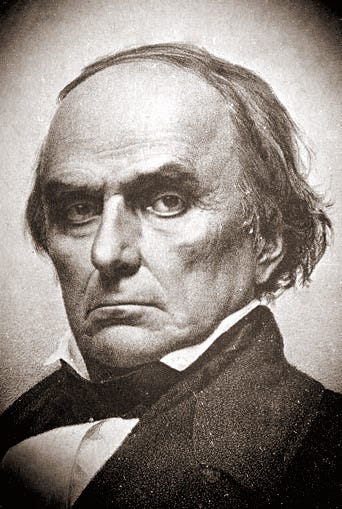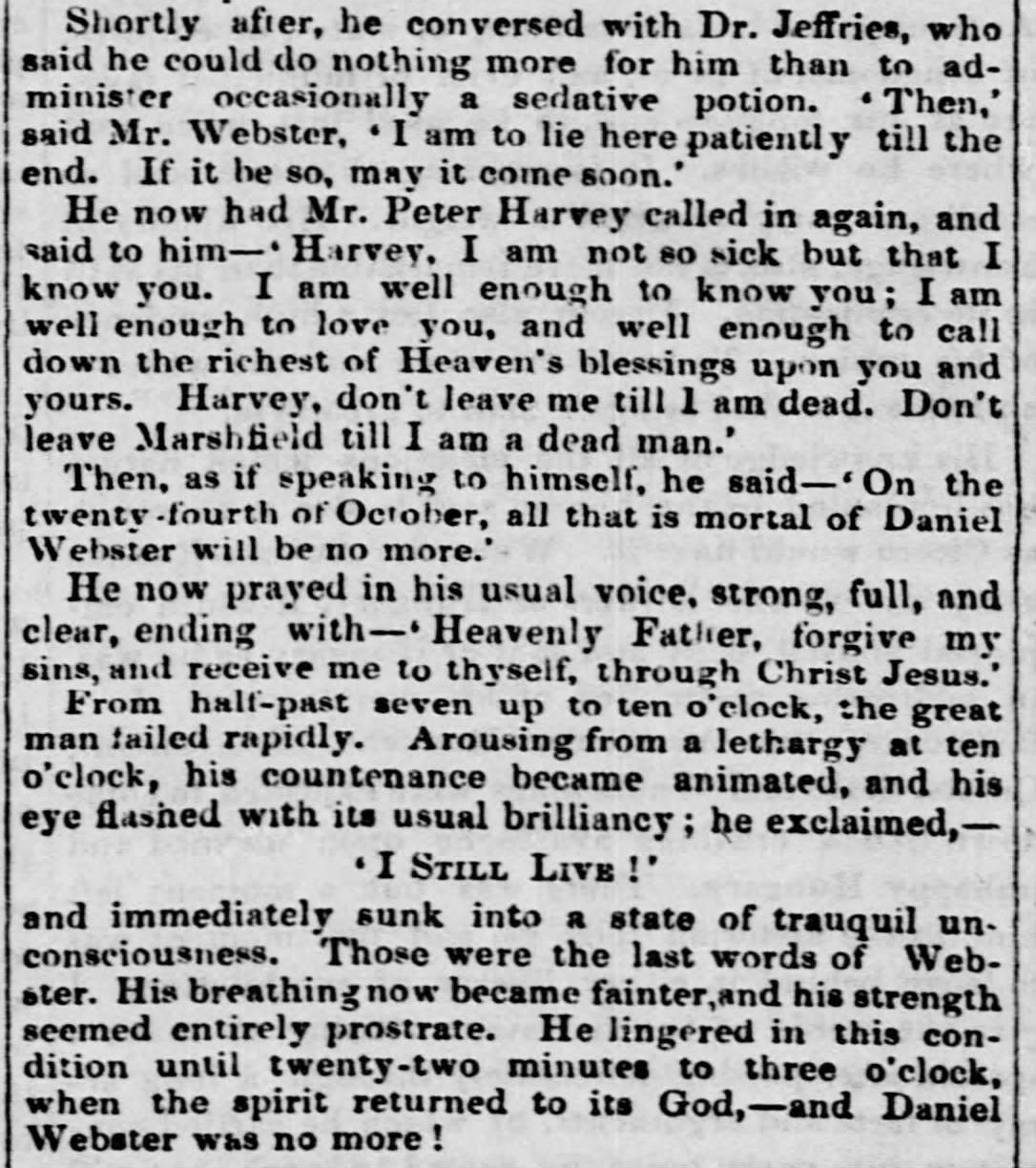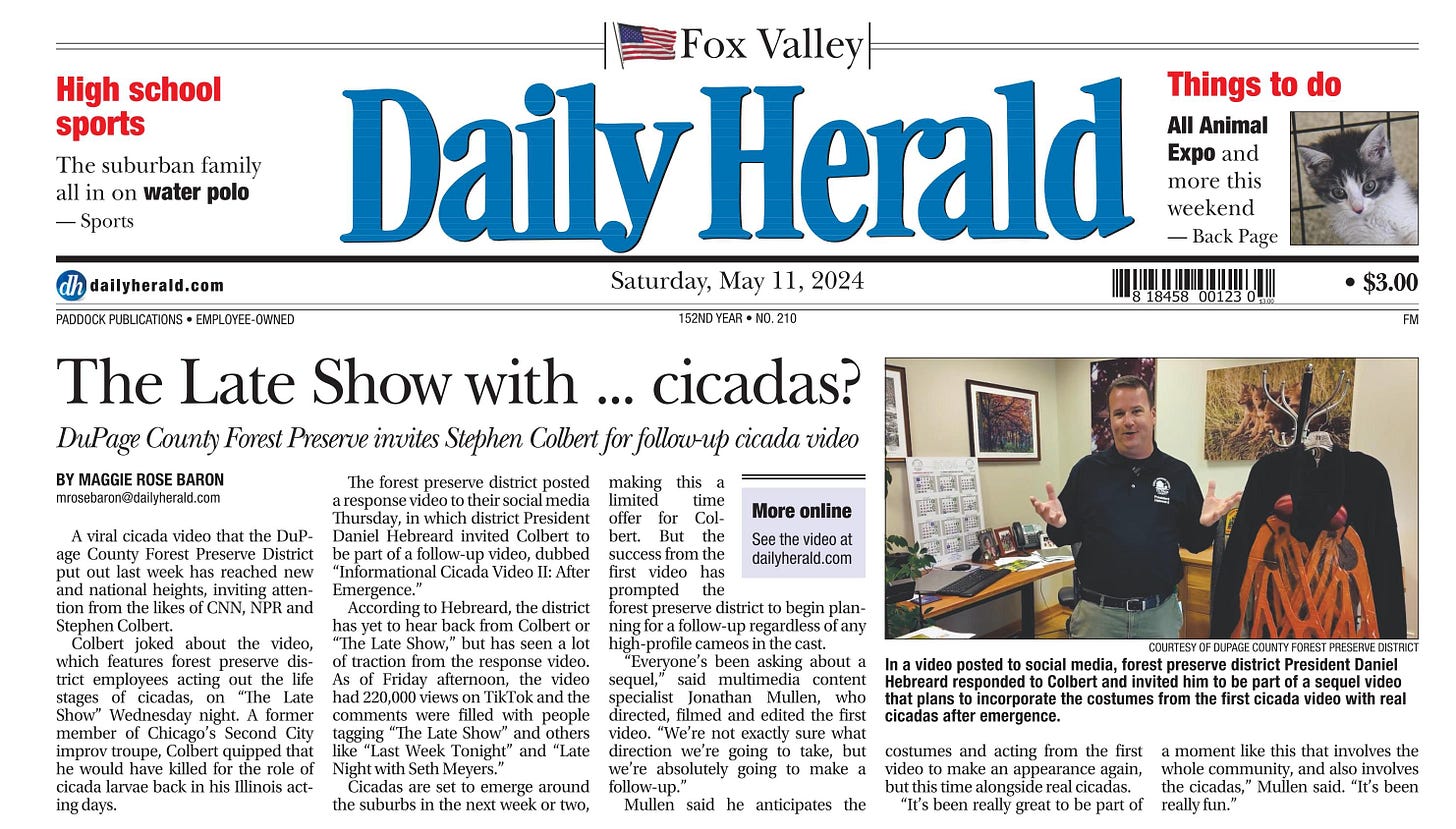Haiku high-five
From Daniel Webster and Donald Trump to my brother Phil and my electronic `pack rat' ways, here are five poems with the 5-7-5 syllable sequence.
Seems to me that it’s time for a “less is more” column.
Less words, more haiku—or haikus. (Pronounced “high-koo,” the plural form of this style of poetry can be with or without the “s”.)
You might ask: What the heck’s a haiku?
With Japanese roots
First, third lines: five syllables
Second line, seven.
Haiku #1
The 5-7-5 pattern conjures my childhood address: 575 Webster Street, just down the street from Daniel Webster’s estate in Marshfield, Massachusetts.
Thinking about Webster, the U.S. Secretary of State under three different Presidents, sent me down a rabbit hole.
In the October 29, 1852 edition of The Liberator1, I found a detailed blow-by-blow of his final few days of declining health. It refers, rather gruesomely, to various bouts of vomiting, but then there’s this passage about the 70-year-old:
My haiku:
Before Webster died
The tranquil unconsciousness
A good way to go.
Haiku #2
Former President Donald Trump’s hush-money trial is playing out in New York, but I only have so much time to absorb even a small fraction of those goings-on, let alone muster the energy to write about them.
It’s a marathon with him and all the authoritarian, democracy-undermining baggage he lugs, with many more miles to go.
However, I did recently get a request from a film documentary maker asking for permission to use a video clip I shot in March 2016 at Trump’s aborted rally at the University of Illinois at Chicago.
Here's the clip:
At the time, I wrote a column, 7 Take-Aways from the Trump Rally in Chicago.
Borrowing from my seventh take-away, here’s my haiku:
There are ties that bind
Those on the left and the right
Let’s find common ground
Haiku #3
This next one comes on the heels of last week’s column, Closed-door meeting, about my brother Phil, whom I hadn’t seen (but had heard) in my most recent visit to his apartment.
Three haiku stanzas follow, drawn from my brief interaction last Saturday afternoon on the way home from my office. I took a slight detour off I-88, spotted him, parked in the far southwest corner of a very congested Oakbrook Center lot, then caught his attention across the intersection.
Saw Phil Saturday
At his public street workplace
We spoke three minutes.
He declined my cash,
My bid to spend time with him,
Then trudged back to cars.
At least he’s alive
One day at a time, they say
Hit bottom soon, bro.
Haiku #4
For years, I’ve been waging a storage capacity battle with all my files, particularly photos and videos that are inching toward 15 gigabytes on my Google drive.
Video snippets from Cubs and White Sox games are among the biggest culprits, with my chronic habit of capturing plays that seemed momentous at the time but upon further review are not so compelling.
Take this four-second clip from July 2, 2022—please! It shows Red Sox shortstop Xander Bogaerts drawing a base on balls at Wrigley Field against the Cubs. Riveting!
Google keeps warning that if I reach my upper limit of free storage, I won’t be able to send or receive e-mails from my seldom used gmail account.
My haiku:
Am I a pack rat?
A devout historian?
Somewhere in between?
Haiku #5
My daughter continues to write across a wide spectrum of topics for the Daily Herald here in Chicago’s suburbs. A few recent articles have centered on the emergence of cicadas, something I touched on at the end of my column two weeks ago.
Here’s a follow-up she wrote last Saturday, prompted in part by Stephen Colbert’s picking up on the viral video that Maggie Rose previously covered:
My haiku:
Cicadas, come out!
Five weeks of noise and frolic.
Then go away, please.
Founded in 1831 by abolitionist and journalist William Lloyd Garrison, The Liberator was a weekly publication through December 1865.
Did you know that 7% of my subscribers provide financial support? Of course, you didn’t—but now you do! (From what I gather, that 7% figure is a pretty normal figure for Substack writers.) Thank you to my paid subscribers!
A haiku for free subscribers:
Free to read and join
One-time gifts help us take flight
Even a buck’s cool






I've become interested in learning more about Daniel Webster. I've been trying to get to the bottom of this attitude since I decided I would express it, but I have a prejudice that the best thinkers and writers are not politicians. It's really nothing against politicians per se, just a belief that the best thinkers are not practitioners, and that too much is probably made of politicians, some of our most public figures. I assume most of those who are writers first and foremost also assume politicians are second raters, but what has struck me is that great writers both of Webster's time and today seem to show almost unrivaled admiration of him. He belongs in the pantheon for them. Webster also intrigues me because too many of us start with the presidents when we think of the greatest Americans. It's fun to have people that I champion whose only shortcoming was that they weren't president. In their day, I think Henry Clay and Webster were on the list of greatest Americans and are now rated lower by amateur historians, if they are rated at all. So that's really cool that you are from the same town as Webster. Pending my greater knowledge of him, you shoud be proud.
Of course, I could look these things up, but I thought Webster was faulted by historians for not being more forceful against slavery. Wasn't he a Whig? The juxtaposition of William Lloyd Garrison and Webster thus caught me by surprise, until I realized that it wasn't as if Garrison was with Webster at his deathbed, or that everything in his paper would represent his point of view. I know Garrison evinced a religiosity that would probably seem quaint to us, so I did see find unity in Webster's single-minded focus on his soul in his last moments and Garrison's philosophy....Maybe Webster was more anti-slavery than I realize. Maybe he was more towards the anti-slavery side than Clay.
In trying to get to the bottom of my fascination with a great thinker being in government, to me that is like the breakthrough of Bill James working for the Red Sox. It's the way I've thought things should be. I used to think that it was just the path to power that the great intellects didn't have. I found similar fascination in reading about John Stuart Mill's stint as an MP towards the end of his life, and his inability to connect with other politicians and the people (by his own account).
So much said in 5-7-5. Nicely done.